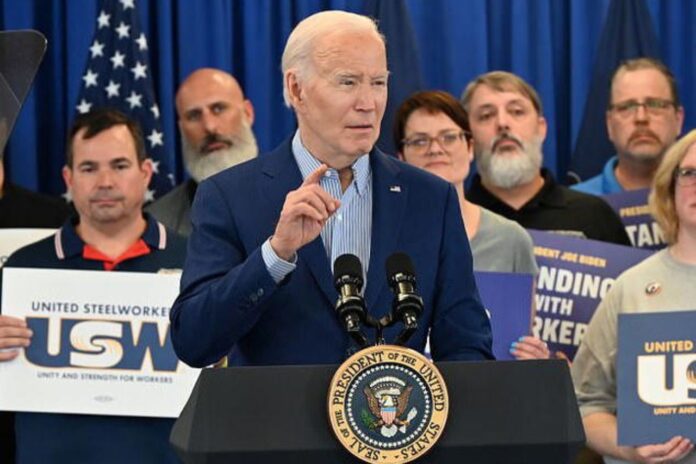In a dramatic turn of events, President Joe Biden has officially blocked Nippon Steel’s ambitious $14.9 billion bid to acquire U.S. Steel, putting an end to a controversial deal that has been making waves for months. The decision, announced on Friday by a source familiar with the matter, is a bold rejection of a proposal from a close ally, Japan, and has left many buzzing with opinions on both sides.
Why Did Biden Say No?
The deal faced heavy opposition from the start. The powerful United Steelworkers Union and many politicians voiced concerns, especially since U.S. Steel is based in Pennsylvania—a key battleground state ahead of the upcoming presidential election.
President Biden, along with Vice President Kamala Harris and even former President Donald Trump, all previously spoke against the deal. Back in September, National Security Council spokesman John Kirby made it clear: “The president believes American steel companies should stay American-owned.”
And Biden stuck to his guns, despite some senior advisors warning this move could strain U.S.-Japan relations. After all, Japan has been a critical ally in countering China’s growing influence globally.
What Was at Stake?
For Nippon Steel, this wasn’t just another deal. Japan’s largest steelmaker had outbid competitors in a heated December 2023 auction, hoping to create a powerhouse in the global steel industry. Combining forces with U.S. Steel would’ve made the new entity the third-largest steelmaker in the world, a major player in a sector increasingly dominated by Chinese companies.
To ease concerns, Nippon Steel made several promises. They offered to move their U.S. headquarters to Pittsburgh, honor agreements with the United Steelworkers Union, and even give the U.S. government veto power over production cuts.
But it wasn’t enough.
Political Drama Unfolds
The proposed merger sparked a political storm, especially in Pennsylvania, where steel is a cornerstone of the economy. With the November presidential election looming, it became a hot topic.
Both Biden and President-elect Donald Trump made their stances crystal clear. Trump, never one to shy away from bold statements, wrote in December: “I am totally against the once great and powerful U.S. Steel being bought by a foreign company.” He also promised to revive U.S. Steel through tax incentives and tariffs.
Despite their efforts, U.S. Steel shareholders had overwhelmingly approved the merger earlier in the year, leaving the final decision in Biden’s hands.
What Happens Next?
This decision could have ripple effects on U.S.-Japan relations. Japanese Prime Minister Shigeru Ishiba had personally urged Biden to greenlight the deal, warning that rejecting it might damage the growing bond between the two nations.
Meanwhile, U.S. Steel’s global ranking as the 24th-largest steelmaker remains unchanged, and its stock took a hit, dropping 4.1% on Thursday.
What Does This Mean for You?
The steel industry may seem far removed from daily life, but this decision highlights the balance between national interests and international partnerships. It’s about more than just business—it’s about politics, economics, and the future of American industries.
What’s your take? Should the U.S. prioritize keeping companies like U.S. Steel American-owned, or is it time to embrace partnerships with allies like Japan? Let the debate continue!





